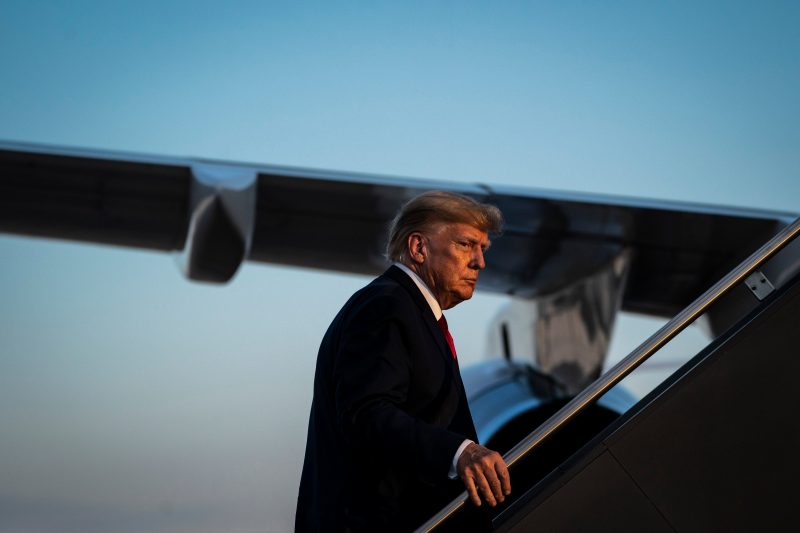“As part of my plan to secure the border on Day One of my new term in office, I will sign an executive order making clear to federal agencies that under the correct interpretation of the law, going forward, the future children of illegal aliens will not receive automatic U.S. citizenship.”
— Former president Donald Trump, in a statement, May 30
Nearly five years ago, President Trump told Axios he would soon issue an executive order that would prevent the children of undocumented immigrants from automatically obtaining U.S. citizenship. The executive order also would have halted what Trump called “birth tourism,” the practice of some mothers traveling to the United States on a nonimmigrant tourist visa specifically to give birth, thus securing U.S. citizenship for children who would be raised overseas.
Trump never issued the executive order. Instead, he only directed the State Department to issue a rule that attempted to crack down on birth tourism by giving visa officers the authority to deny visas to women whose primary purpose for traveling appears to be giving birth in the United States. The Trump campaign claims “tens of thousands” of women do this every year, but the most recent data from the Centers for Disease Control and Prevention indicates that only 5,636 babies were born to foreign nonresidents in 2021 — a figure possibly affected by the pandemic. That number also could include multiple births to the same woman. In 2019, the CDC recorded 10,042 babies born to foreign nonresidents.
Trump knows any such executive order would be quickly challenged and ultimately the Supreme Court would weigh in. What’s changed is that Trump believes he now would have the votes at the court to win a showdown over the legality of the order, having substituted the late Ruth Bader Ginsburg with Amy Coney Barrett.
Here’s a guide to the issue. There is enough ambiguity that legal scholars say the outcome is not entirely clear, but Trump would face stiff challenges.
Only about three dozen countries permit birthright citizenship, and most are located in the Americas — a legacy of the colonial period when European powers sought to quickly populate lands in the New World. In the United States, the right to citizenship upon birth in the United States is rooted in the first sentence of the 14th Amendment: “All persons born or naturalized in the United States, and subject to the jurisdiction thereof, are citizens of the United States and of the state wherein they reside.”
The 14th Amendment was adopted in 1868, repudiating the Supreme Court’s 7-2 decision in Dred Scott v. Sandford, an 1857 ruling that denied citizenship to people of African descent born in the United States.
Some have questioned whether the phrase “subject to the jurisdiction thereof” indicated some limits on this right, but in 1898 the Supreme Court ruled that this right to citizenship covered Wong Kim Ark, who was born in San Francisco to Chinese nationals legally residing in the United States. The justices listed only a handful of exceptions to birthright citizenship, such as the children of foreign diplomats, children born on foreign ships, children belonging to hostile armies on American turf, or “children of members of the Indian tribes owing direct allegiance” to their tribes.
“The Amendment, in clear words and in manifest intent, includes the children born, within the territory of the United States, of all other persons, of whatever race or color, domiciled within the United States,” Justice Horace Gray wrote for the court. He noted: “To hold that the Fourteenth Amendment of the Constitution excludes from citizenship the children, born in the United States, of citizens or subjects of other countries would be to deny citizenship to thousands of persons of English, Scotch, Irish, German, or other European parentage who have always been considered and treated as citizens of the United States.”
In a somewhat related case, Plyler v. Doe, the court in 1982 said Texas could not exclude the children of undocumented immigrants from public schools. “No plausible distinction with respect to 14th Amendment ‘jurisdiction’ can be drawn between resident aliens whose entry into the United States was lawful, and resident aliens whose entry was unlawful,” said the majority opinion by Justice William J. Brennan Jr.
The ruling was 5-4, but the minority opinion mostly objected to the court appearing to set public policy. The dissent agreed the 14th Amendment applied to U.S.-born children of undocumented immigrants, noting that Texas provided schooling to those children.
Similarly, in 1985’s INS v. Rios-Pineda, the court unanimously agreed that two undocumented immigrants “asserted substantially” that their being deported would be “an unlawful de facto deportation of their citizen child,” further indicating support that birth in the United States automatically provides citizenship.
Another complication for Trump seeking changes through an executive order is that the Justice Department’s Office of Legal Counsel in 1995 said Congress could not restrict birthright citizenship even through legislation.
Birthright citizenship is in the Constitution, so the only way to change it is by constitutional amendment, Assistant Attorney General Walter Dellinger wrote. “There can be no question that children born in the United States of aliens are subject to the full jurisdiction of the United States,” he said. “And, as consistently recognized by courts and Attorneys General for over a century, most notably by the Supreme Court in United States v. Wong Kim Ark, there is no question that they possess constitutional citizenship under the Fourteenth Amendment.”
Similarly, a Trump court appointee has raised objections to trying to make an end run around the 14th Amendment. “Birthright citizenship is guaranteed by the Fourteenth Amendment,” James C. Ho, whom Trump later appointed to the U.S. Court of Appeals for the 5th Circuit, wrote in a 2006 law review article. “That birthright is protected no less for children of undocumented persons than for descendants of Mayflower passengers.” He reiterated those points when state legislators sought to pass state-level legislation that would have denied citizenship to U.S.-born children of illegal immigrants. “Opponents of illegal immigration cannot claim to champion the rule of law and then, in the same breath, propose policies that violate our Constitution,” Ho wrote in a 2011 op-ed in the Wall Street Journal.
Mark Krikorian, executive director of the Center for Immigration Studies, which advocates for tighter immigration policies and is frequently cited by Trump, said he suspected even this Supreme Court would not look favorably on the policy changes that would result from such an executive order. Such policies could include the State Department not issuing passports to children born without at least one parent who was a U.S. citizen or green-card holder or the Social Security Administration not issuing Social Security numbers to newborns in the same situation.
“Even this Court wouldn’t uphold them, ruling that this is a matter at least for legislative change, if not a constitutional amendment,” he wrote in an email. He said he personally would prefer a system in place in Australia, where citizenship is denied at birth (the infant inherits the same visa status as the parents) but then is granted if the child lives in the country for the first 10 years after birth.
(About our rating scale)
Send us facts to check by filling out this form
Sign up for The Fact Checker weekly newsletter
The Fact Checker is a verified signatory to the International Fact-Checking Network code of principles








